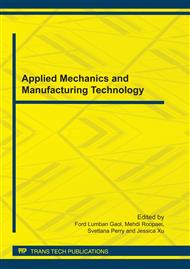p.140
p.146
p.151
p.155
p.159
p.164
p.170
p.178
p.182
Investigating Mass Customization Implementation in Iranian Manufacturing Organizations
Abstract:
The aim of this article is to investigate the extent of mass customization (MC) methods implementation in Iranian manufacturing organizations, mainly based on a descriptive analysis. Based on the review of literature seven methods and motivators and barriers of MC implementation were identified. Through a questionnaire which was distributed among 100 Iranian manufacturing organizations the extent of MC methods applied in the surveyed organizations was studied. And their priorities were determined. Results showed that these organizations have found out the importance and the role of mass customization strategy in fulfilling customer satisfaction and intimacy which could hopefully lead to the increase of their revenue and market share. But based on chi-square test the present study cannot confirm that the use of customization methods and strategy is significantly related to greater company success in Iranian manufacturing context.
Info:
Periodical:
Pages:
159-163
DOI:
Citation:
Online since:
August 2011
Authors:
Keywords:
Price:
Сopyright:
© 2011 Trans Tech Publications Ltd. All Rights Reserved
Share:
Citation:


